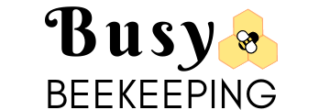You may be ready to harvest some honey from your own hive for the first time, and this is certainly a very exciting event, because no other honey is going to taste as good as the honey from your own hives!
But, before you harvest that delicious golden substance, have you considered what you’re going to do with the frames and supers after you’ve extracted the honey?
One thing is for certain, you will need to do something with the frames (sometimes called wet frames or stickies) and supers pretty quickly to ensure they aren’t going to attract bees and pests that like the taste of your honey.

If you can, it’s best to do something with the wet frames and supers the same day you extract. If not the same day, the next day after extracting the honey.
If you need to do it the following day, ensure the frames and supers are stored overnight in a room the bees can’t access.
So let’s look at what you can do with the frames and supers once you’ve extracted the honey from them.
What to do with frames after extracting honey
Below I’ll outline what to do with frames after you’ve extracted the honey, and you’ll be guided by whether or not there is a nectar (or honey) flow and the weather/seasons.
If there is a nectar flow, the wet frames can be put back in the hive for the bees to store more honey in. A nectar flow is described as the period of time when one or more major nectar sources are in full blossom and the weather conditions are ideal for the bees to fly out and collect a lot of nectar.
It’s best to put the wet frames back on the hive late in the day when there’s less chance of robber bees attacking.
If there’s no nectar flow, you can still return the wet frames to the hive for the bees to clean up overnight before you store them for winter. Many beekeepers do this because if you don’t, the wet frames of honey will absorb moisture and begin to ferment during storage.
As before, put the box of frames on top of the hive and replace the lid. Once again, do this late in the day to prevent robber bees from attacking. Overnight, the bees will remove the honey.
Once the frames have been cleaned up they can be prepared for storage. Put each frame in a plastic bag, secure it and store it in the freezer for 48 hours. Doing this will destroy any wax moth larvae that may be on the frame.
After 48 hours in the freezer, store the frames in an airtight tub until needed.
What to do with a super after extracting
What you do with the super after extracting the honey depends upon whether there is a nectar flow.
If there is a nectar flow, the super and the wet frames can be returned to the hive for the bees to use again to store honey.
If there’s no nectar flow, the super with the wet frames can be placed on top of the hive late in the day and left for the bees to clean the super and the frames.
Once the frames and super have been cleaned up, they can be removed and stored. The super isn’t stored the same way as the frames. It doesn’t need to be put in a bag or the freezer.
Instead, on a sunny day, give it a good scrub with warm water to remove any residual honey and leave it in the sun to dry. Then repair any cracks, sand it and paint or stain it before storing in a dry place until it’s needed again.
Can bees clean an extractor too?
No, an extractor shouldn’t be left for the bees to clean up. Although some beekeepers do this, I wouldn’t recommend it as it will attract hundreds of bees from other hives to your garden in a feeding frenzy. This is a perfect way for disease to spread.
Clean your extractor in a bee-proof shed or garage and do it pretty quickly after you’ve finished extracting.
First, close the honey gate, pour in some warm water, and wash your extractor with a soft cloth. Once finished, open the honey gate and let the water empty into a bucket. You might have to do this more than once to remove all the honey.
Then, dry with a soft clean cloth and leave the lid open to let it dry completely. I put a clean sheet over it once I’m finished.
Final Thoughts
Hygiene is important when extracting honey because disease can spread from one hive to another. Cleaning up after extraction is important, and doing it quickly is necessary to avoid attracting other bees or pests to your yard.
